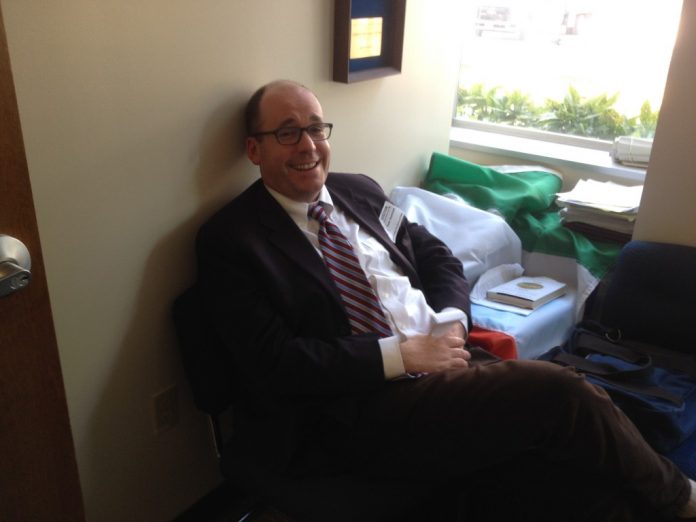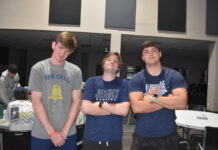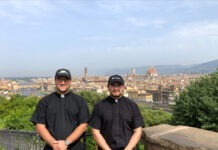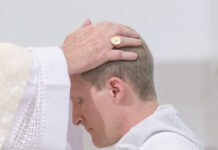Here at Jesuit, we have many alums who have accomplished great things. From golfer Jordan Spieth to this year’s distinguished alum Congressman Michael McCaul, Jesuit alums truly exemplify careers and talents across the career spectrum. Recently, another former Jesuit student, Sean Desmond ’89, a book editor best known for his work on President George Bush’s political biography, Decision Points, visited the Roundup junior staff for an interview.
Mr. Sean Desmond: I’ve done eighteen years of book publishing, working at various book publishers. No I am an editorial director, a book editor, at a place called Twelve Books. It is exactly as it sounds, we feature a book a month. I do mostly non-fiction books, I do a lot of books on history, politics, current events, and foreign affairs. The most famous book that I’ve done is the on that Dr. Degen has, Decision Points, by President Bush. So I got to come down to Dallas and worked on it, and I was checking out the Roundup website, which it is very, very impressive how you guys edit it. Back in my day (this is going to sound like old man stuff, but anyways) we would lay out the paper by hand, and used wax, and would print things off of the one laser printer that there was in the building. It took a lot of time to lay things out, and we had a paper, or edition, so that’s the old school version of the Roundup, but the stories and the content is the same. That’s what you guys are, and that’s what I am, we are content editors. It’s really exciting to be here today, really exciting to come back, it’s really nostalgic for me, and I’m so glad to see the paper live on and have people working on it. We only had, like, five or six people working on it in my day, and we would put out one per month.
Henry Ainsworth ‘16: Can you tell us about book publishing?
SD: So, New York is where most commercial book publishing is. There are various kinds of publishing, there’s academic publishing, for the textbooks you use, there’s religious publishing, publishing bibles and prayer books. I work in what is called trade and commercial publishing. The easiest way to describe that would be the books that you see in the front of a Barnes and Noble or the front page of Amazon.com. There are five big publishers in New York, and I have worked at three or four of them. I work at one right now that’s called Hachette Book Publishing. A book editor does three things basically; they find projects, edits those projects, and oversees that they are put out into the world and that they are successful. That’s what I do. A lot of my projects come from people who are famous, like President Bush, or someone you’ve seen on TV. As I said, I do non-fiction. I should also tell you that I’m a writer, I wrote a novel. That happened.
Dr. Michael Degen: What was the Bush experience like?
SD: President Bush is a wonderful person, and he was wonderful to work with. He lives here in Dallas, as you all know, and his
office is in University Park. We signed up the book with him in January of 2009. We worked for two years on the book together. What was cool about that was that I got to ask all the questions you would want to ask the leader of our country that brought us into two wars; what the response to [Hurricane] Katrina was like, what it was like to be president. I got to play that role. I read and did a lot of research. I read a whole self of books on him, from when he was a child growing up in his father’s house all the way up to his presidency. He’s a very funny guy. This interesting this is that the book is called Decision Points, and each chapter is about a big decision he had to make in his life. All of the chapters are dense, like the one on Iraq, you could write a whole book on that. How do you condense everything and still get to the point? So the structure helped us to do that, by focusing on the decision. I learned two things from it. The first was that being president is a very, very difficult job, and often on the job, the big decision is deciding between two bad alternatives, or bad and worse alternatives. For example, the financial crisis that happened in 2008, do you allow banks to fail because they took on bad mortgages, or do you bail them out because it would hurt everyone else’s pocket money. Decisions that are very hard. The second thing was all the history that he witnessed, for example 9/11, the invasion of Iraq, the Lazarus effects, which was a series of plans and programs that were for the purpose of helping eradicate malaria and other communicable diseases. He saved millions in Africa. It was such a great Christian work, hence its name.
Mr. Paul McDaniel: When you work with a writer do you let them say, largely, “here’s what I want to write about,” and then do you try and condense it and make it better?
SD: It can happen that way, but more often on a non-fiction book, we start with an outline. And then we fill out the outline and see how one chapter sounds and its voice, to see if it fits the story, what the themes are. I usually start with a proposal or an outline, and we go from there. I have had books that have come in, and have been twice as long as they should be. I have had books come in at 200,000 to 250,000 words, and we needed to cut them in half. It’s hard, but that’s what an editor does. Just like the Roundup, you have to keep an eye on word count constantly. It’s a little different now because you don’t have space restrictions. Editors will still feel the need to pull at least ten percent back out of the story.
PM: So for instance, when President Bush approached you, you probably thought he wanted to do a biography, but he said that he wants to take specific events, so you ask him which specific events he would like to cover, when you say outline…
SD: Exactly. We outlined what the big decisions were. We took the big moments, and condensed them into decisions. It was a lot better than what most politicians do, like long and windy phonebooks and recounts of everyone they ever knew. They’re sort of lists of everyone who was ever great to them. It isn’t very interesting. This is an interesting book. Agree or disagree with Bush’s policies, you can read the book and walk a mile in his shoes to see how he got to the decisions that he came to. That was the good thing about the structure.
MD: Did you ever get into arguments with him?
SD: NO! Never!
MD: Yes of course! Did he do most of the writing?
SD: Yes. He had someone who worked with him, his name is in the book, it’s Chris Michel. He was sort of a speechwriter for Bush. Bush did write and work on this book throughout several drafts. He took a lot of pride in the book and made a lot of effort. And it was successful! It was a big bestseller.
PM: Is part of your responsibilities to say, in a sense, “maybe we should go back to this topic,” or “I would like to know more about this,” in a sense?
SD: That’s what I got out of Jesuit the most. I had really good teachers who taught me how to argue and think on the page, and not just read and regurgitate. That’s a Jesuit tradition, even the word, “Jesuitical,” means argumentative. That’s what I did. I would look at the manuscripts, and in the margins, I would write my questions, just like you would get a test or a paper graded. I ask from more details and I ask myself, “What would the reader like to know here.” That takes training. The best training is reading and writing a lot. If you go to law or business school, they teach you how to be a lawyer or how to do business. Being an English major, they don’t do that. It’s more of an apprenticeship. It started, for me, on the Roundup and Mr. Oglesby’s class. He was my freshman English teacher.
HA: What was your own book about?
SD: Yes! So, I went to Harvard College. I wrote a ghost story set at Harvard in my dorm, Adam’s House. It was creepy, old, and wood-paneled, and it had pictures of John Adams and Sam Adams and the rest of the Adams family everywhere. I thought my room was haunted. So, to give you what book publishers call the “elevator pitch,” it was The Shining goes to Harvard. It’s basically about a boy who’s stressed about exams, and he doesn’t know if he’s crazy, or if he’s seeing ghosts. It is called Adam’s Fall. I wrote it and it was published. They then made it into a movie! It is called Abandon.
MD: Did you like the movie?
SD: I thought it was great! It didn’t win any awards. What it had a problem with, which I had too while writing it, was “What am I trying to do?” Was I trying to write Hamlet, or something very serious and literary, or was I just trying to write a good, old-fashioned scary story, like The Shining by Stephen King. In than sense I think I failed, but I succeeded in the way that I got published.
HA: When you were looking to get published, did you stay local, or did you go elsewhere?
SD: That’s a good question. I was working in publishing and I got a literary agent. He liked it and sent it to a bunch of publishers and one, St. Martin’s Press, made an offer. They offered me an advance, a big $10,000. Mr. Bush’s was $8 million. Anyways, I was so excited just to have a book.
Mr. Fritz Asche: How did you end up getting chose to do the Bush book?
SD: So where I work in New York, the editor that probably should’ve done it left book publishing a few months before it became a project. I went down to Dallas. I lived in Dallas around the same time President Bush did. Then he went to be the Governor of Texas. But from ’84 until ’92, we lived in Dallas at the same time. So we bonded. I asked him “How are you liking Dallas?” He had just moved back to Dallas. That meeting went well. I have had meetings with authors that have not gone well at all. I was lucky to have gotten the chance to do this. I think the publisher thought that since I had grown up in Dallas and that I was familiar with political works, that I would be the best choice.
PM: You had done other political books before?
SD: Yes, I have done a lot of political books. I don’t know how I ended up doing that. I’ve done everyone from Ralph Nader to Pat Buchanan and everyone in between. Just this August I did a book with Congressman Paul Ryan, who ran with Mitt Romney. He’s a very nice guy. I would say that he could’ve gone to Jesuit with me. He’s only two years older than me with a very Catholic background. He’s from Wisconsin. Very similar background to anyone I went to Jesuit with. It’s not a very glamorous life. I mean, George Bush has a nice, big house here in Dallas and a very nice office in the middle of University Park. To work with Congressman Ryan was very different. I would take the train from New York down to Washington DC, then I would walk across to the Capital Building and there’s an office right there at the edge of the big rotunda, Congressman Ryan’s. He would get there around 7PM and we would work for about five hours until midnight. Anyways, he would sleep in a cot in his office, and shower and shave in the gym that was there for them. On the weekends, he would go back to Wisconsin with his family. He was very humble and down-to-earth. He has three kids. He’s not a rich man. He has travel expenses and everything. What I admire about his man is that he does this job despite the difficulties, and he is not getting rich off of it. We often think of politicians of “fat cats,” but he’s someone who would have been the class of ’89 ahead of me.
Jack Durham ’16: When you’re working with these people, do you sometimes end up writing part of the book?
SD: Sometimes. Or sometimes I rewrite. Most of the editing I do is on a macro level, like moving things around and putting things in the right place. Other times, I do what I call a “polish,” which is a line-by-line edit, which is where I would end up doing some of the writing.
JD: Did you have to do that for President Bush?
SD: No, I usually just kept making suggestions. He’s a good writer. His book is in his tone, which is frank, honest, and funny. It sounds like him, to me. He doesn’t use a ton of four-dollar words. There was less of the line-by-line in this book. It was more of the macro editing, where we would try to decide what we were trying to say in this chapter and tightening it down. Like the chapter on Iraq; we could’ve written a chapter 10 times longer, in fact there could’ve been a whole shelf on why we invaded Iraq and I still don’t understand. We had to cut that chapter down to the bare essentials. It was challenging.
PM: You said that your freshman English teacher was Mr. Oglesby, over your time at Jesuit, particularly for Juniors, when did you start to see yourself as a literary person?
SD: Is Junior year still world literature?
MD: Yeah, it’s more European literature.
PM: Do you remember who you had sophomore year?
SD: Mrs. Felice. Mr. Oglesby, freshman year, would beat us with sticks if we got something wrong, and if you tried to fall asleep, he would pull you by the tie knot and out of your chair, I’m not kidding. He taught us the Odyssey and The Lord of the Flies, and he would make us journal every night, which is how I got interested. He would give us strange topics that we would have to research, and we would be required to write about one hundred words, but it clicked with me and I would write pages and pages. I got good at that. Then Mrs. Feliz’s class was American literature. She taught us the classics, like The Great Gatsby and The Scarlett Letter. Mr. McGowan was my senior year teacher. It was his first year here. Junior year, we read Macbeth and a ton of other things. Here’s the thing, if you want to become an English major, you should know three things; mythology, Shakespeare, and the Bible. All the older art in our museums are based off of those three things. Just know those, and you will be a successful English major. We studied a lot of Shakespeare when I was here. I went to Harvard, where a lot of smart cookies, and people would be reading Thomas Hardy or George Eliot, and they wouldn’t understand half of the Bible references. I was raised in a very Catholic family and I know my Bible, so I understand, better, the readings. Now, twenty years later, I’m editing the book to a former president with a chapter about the Lazarus effect, and I know what that means. It comes in handy.
JD: How did you get into publishing from Harvard?
SD: How did I get my job? I did a lot of internships. I did one at the Atlantic Monthly Magazine and I edited “Let’s Go Travel” Guides at Harvard. I just kept editing and taking internships over the summer and the school year. How did I get my job in publishing? Well, I broke up with my girlfriend who moved o Washington, so I moved to New York. One of my friends gave me the names of five publishers there. I would go to these people who I didn’t know and ask, “How do I get a job in publishing?” These are called informational interviews. Every time, I would ask them to give me names of five people I should talk to. That’s called networking. The fifth person I talked to gave me my first job because his assistant was leaving. I got paid $19,000. That’s nothing. It was still sort of an apprenticeship. I worked at a place called WW Norton. I worked for two editors there. I worked for an old-fashioned science editor named Ed who had an amazing list of science authors. I also worked for a guy named Jerry who did a lot of fiction. He did the book Fight Club. I read Fight Club even before it became a book. I read it as a manuscript. That’s how I networked. That’s how pretty much everybody networks. Just keep asking for names.
HA: Who’s your favorite writer?
SD: Top-five for literature. Tolstoy, Salinger, Fitzgerald. Ooh. Shakespeare. Shakespeare is number one. That’s an easy one. This might have been disproven, but the average vocabulary for a writer, how many words a writer, is around 30,000 words. Shakespeare is five times that. He invented words. He also created a ton of types of characters that you see today in movies and other things. Shakespeare is my favorite.
Thomas Horton ’16: This is more on the editor side of things. Have you ever worked with someone who is not a great writer, but has a good story? In other words, have you ever had to try to keep their tone, despite them being a bad writer?
SD: Absolutely. It’s hard. Sometimes you have to hire profession writers to help somebody. What is writing really? Is it what I did for Mr. Oglesby? Is it a diary kind of structure that doesn’t really have a plan, just what you feel? Is it an intuition kind of thing? It’s cathartic. It gives you a release of expression, emotion and feeling. Usually you want writing to be prescriptive and professional. People get lost in the words and stray from the structure and the meaning. I have to deal with that everyday. I’m working on a book with Henry Paulson, who is our Treasury Secretary. He is writing a book about China and the twenty years that he was in charge of Goldman Sachs and opening up the Chinese economy. China is not a democracy, like us. It is a communist state. The problem is, Mr. Paulson knows so many people in China in government. Everyone has a “Chinese” name, and a “Western” name. It gets confusing. We have to do a cast of characters and decide which characters we are going to include in the story. There’s a ton of decision-making like that. It’s a lot of fun. He knows what’s going on. He knows history ten times more than I do. I’m just doing the copy. Hats one of the cool things about being an editor. It continues my education, in a way. You get to know things that maybe you wouldn’t otherwise.
JD: Who’s the most interesting author you’ve worked with?
SD: Bush is definitely up there. He’s a really fascinating person just because of all the history. I’d love to tell you that I did these crazy successful sports books and that I’m a great friend with Magic Johnson. I’ve done books on the Cowboys with professional sports writers. But sometimes you do the book and move on. I did a book called Muck City. It’s a year in the life of a town called Belle Glade, Florida. It’s one of the poorest places in the country. Its roots are a bunch of sugar plantations and its people are primarily Afro-Caribbean. Why did we write a book on it? Because it is the town where the most players in the NFL came from, with 48 players. It’s kind of like Friday Night Lights, just in a really poor town. The writer, Bryan, served in the peace corps in Kenya, and he went to Belle Glade, and thought that it couldn’t be a place that existed in the US. So he follows this team, and for a certain percentage of kids who are great at football, this is the way out of Belle Glade. He follows Kelvin Benjamin, who’s going to be the next Randy Moss at the age of 17. All of the colleges around him were trying to scout him, and for KB, it creates an interesting dynamic. Bryan also wanted to create a story about the other percentage of kids that don’t have football as a means of getting out. So he talks about a girl who becomes a Gates Scholar and goes off to medical school. This book is a great book about football, but it is also a great story about this town. And, of course, two years later, I’m watching the championship game, and who catches the winning touchdown? None other than Kelvin Benjamin.
HA: Do you ever get into arguments with your writers?
Blake DeLong ’16: How would you resolve that?
SD: Persuading writers is hard. Usually you just have to start over, or do it yourself. There’s really no in between.
SD: Thank you guys for the great questions and letting me come back!






